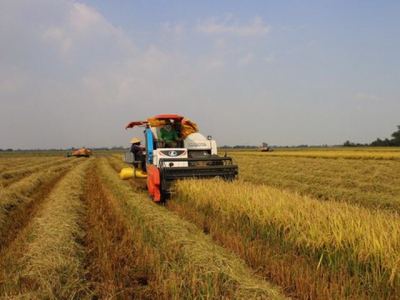Scaling up a rice growing model in the Mekong Delta in response to climate change

After a year of piloting, the model on 'rice farming transforming to adapt to climate change' has been evaluated and is ready to be expanded throughout the Mekong Delta area.
The Department of Crops Production and the National Agricultural Extension Center (NAEC) creat a pilot model on Transforming Farming Systems Under Climate Change (TFCC) to determine future rice cultivation techniques in the face of climate change effects.
The CGIAR Research Program on Climate Change, Agriculture, and Food Security in Southeast Asia (CCAFS-SEA), the International Rice Research Institute (IRRI), and the DeRISK Southeast Asia Project Asia are collaborating on the project. The International Union for Biological Diversity and CIAT are also involved.
On November 4, stakeholders convened a workshop to examine the results of the one-year model and develop strategies for replicating it and implementing the project's recommendations.
According to NAEC Director Le Quoc Thanh, the initiative is a solution that brings together units of the Ministry of Agriculture and Rural Development and a number of foreign organizations and has resulted in very beneficial and practical impacts on production.
"This is a novel method that enables producers to be actively engaged in the planning process, visualizing strategies to address climate change while recognizing that its influence on output is not uniform. Exports in the Mekong Delta area are more robust and consistent," Mr. Le Quoc Thanh said.
Scaling across many areas
The Department of Crops Production and NAEC devised and presented during the workshop a roadmap for scaling up TFCC to additional agro-ecological zones in the Mekong Delta, with input from all stakeholders. The scale-up strategy will serve as a roadmap for local stakeholders in managing and implementing comparable initiatives.
Mr. Le Quoc Thanh said on the margins of a seminar on this subject that TFCC is a strategy that may be used in places impacted by climate change.
"We will encourage individuals to join more actively and to spread the word about the efficacy of this approach." A strategy has also been formed within the agricultural extension system to duplicate the TFCC outcomes in other provinces in the Mekong Delta and places at high risk of climate change effects," Mr. Le Quoc Thanh said.
Additionally, stakeholders generated risk maps and climate change adaptation plans (CS-MAPs) as well as local climate information services (at the commune level) during the workshop. Discuss the appropriateness and efficacy.
Adaptation plans designed for rice-producing areas include strategies for seed selection, agricultural practices, and harvesting schedules.
Additionally, a range of adaptation approaches, such as variety conversion, crop diversification, and land conversion to other crops, have been found. The collaborative production of the Agricultural Crop Bulletin (ACB) has been warmly accepted, particularly in light of recent improvements aimed at enhancing district and provincial stakeholder engagement and communication frequency.
On November 4, the session presented Technical Documents on CS-MAP development and a Local Agricultural Consultant. This article outlines the fundamental procedures necessary to conduct participatory risk mapping and adaptation planning at the local level. Additionally, the technical paper discusses in depth the process of developing and disseminating a Local Crop Advisory based on meteorological and climatic data.
Applying to the commune-level
The Climate Change Adaptation Planning and Risk Mapping (CS-MAP) strategy has been adopted down to the commune level to build the agricultural consultation, followed by the construction of agricultural newsletters (ACBs) appropriate for each locality's circumstances.
Participants in CS-MAP work together to identify climate-related risks using scientific evidence, local knowledge, and risk assessment; improve proposed adaptation measures; and develop integrated adaptation plans for rice production from regional to provincial levels.
Participatory agricultural suggestions are based on the CS MAP and crop planning and management advice based on weather and crop predictions.
The TFCC concept has been tested in three Mekong Delta communes: Hoa Chanh (U Minh Thuong district, Kien Giang province), An My (Ke Sach district, Soc Trang province) and Tan Phuoc (Go Cong Dong district - Tien Giang province).
Có thể bạn quan tâm
 Smart agriculture development in urban areas
Smart agriculture development in urban areas To promote smart agriculture in Vietnam, Associate Professor Ph.D. Dao The Anh, Deputy Director of the Vietnam Academy of Agricultural Sciences
 Restoring fruit sector-key task of the Mekong Delta
Restoring fruit sector-key task of the Mekong Delta Fruit sector is one of the three strengths of the Mekong Delta, so restoring and stabilizing it is an important task that localities within the region have been
 The qualitative transformation of Vietnam’s rice
The qualitative transformation of Vietnam’s rice The structure of Vietnam's rice for exports has shifted towards increasing the proportion of high-value-added rice varieties and reducing the rate of low-grade